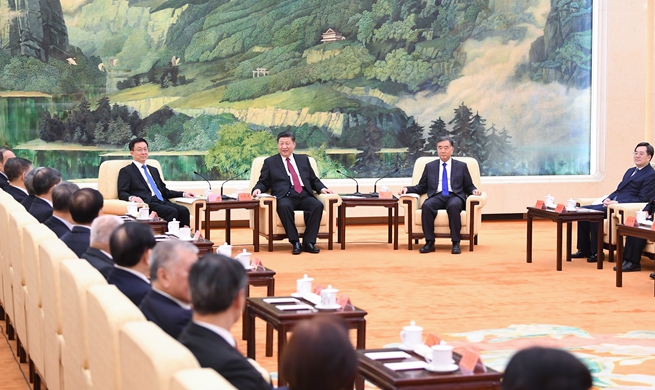BEIJING, Jan. 31 (Xinhua) -- Rules on a new board for innovative enterprises at the Shanghai bourse have set the stage for what analysts call the most "historic" reforms in the country's stock market in nearly 30 years.
The China Securities Regulatory Commission (CSRC) unveiled a guideline on the science and technology innovation board late Wednesday, outlining eased access to listing with a much-anticipated registration-based initial public offering (IPO) system and stringent delisting regulations.
The sci-tech innovation board will focus on companies in high-tech and strategically emerging sectors such as new generation information technology, advanced equipment, new materials and energy and biomedicine, the CSRC said in a statement.
Under the pilot registration system, eligible companies can become listed by filing required documents. Currently, new shares of the A-share market are subject to approval from the securities watchdog.
While the guideline is inclusive in introducing five sets of qualification standards to suit different financial conditions of science and technology companies including loss-making companies, it is much tougher when it comes to information disclosure and delisting terms to protect the interests of investors.
Introduction of the board and the pilot registration system at the Shanghai Stock Exchange (SSE) was made public in November as China seeks to better implement the innovation-driven development strategy and deepen capital market reform.
The new board is crucial to optimizing the multi-tiered capital market system and enhancing the capital market's capability to serve the real economy and facilitate the cause of building Shanghai into an international financial center and science and technology innovation hub, the SSE said on its website.
Nearly 30 years after the establishment of the SSE, seen as a starting point of China's securities market, analysts see the guideline as more of a blueprint for broader reforms than a mere list of "dos and don'ts" for the sci-tech board itself.
Dong Dengxin, head of the research institute of finance and securities with Wuhan University of Science and Technology, said the board and pilot registration system would open a new chapter in the history of the A-share market.
"The rules and concepts of the board are revolutionary breakthroughs," Dong said. "They will fundamentally change the scheme for listing and trading, and more importantly, reshape investors' philosophy and risk awareness."
He said greater market inclusiveness unleashed by the registration system will bring about a stronger market-based regulation mechanism, which highlights "foot voting" of risk-savvy investors and the responsibility of securities intermediary institutions.
"It will have a profound influence on the future rollout of the registration system in the main board, the SME board and the ChiNext board," Dong said.
Li Xunlei, a chief economist with Zhongtai Securities, said rules of the sci-tech board would address the insufficiency of the A-share market found over the years, noting that allowing differentiated listing requirements could help more premium firms list at home.
"The profit indicator has been the main gauge on whether a company can go public," Li said. "The practice has somehow deprived many promising firms which are temporarily in the red of their opportunities to list in a timely manner for faster development."
Around 150 enterprises will get listed on the sci-tech innovation board this year with total funds raised reaching 50 to 100 billion yuan (7.4 to 14.9 billion U.S. dollars), according to investment banking firm CICC.
"The board is expected to attract the entry of overseas-listed China Concepts Stock heavyweights in the future," CICC said, referring to mainland-based companies which chose to go public on major foreign exchanges for faster capital access.
By the end of October, China had the world's fourth largest number of listed firms, 3,573, with a total market capitalization of 44.65 trillion yuan, the second largest in the world, CSRC data showed.

















